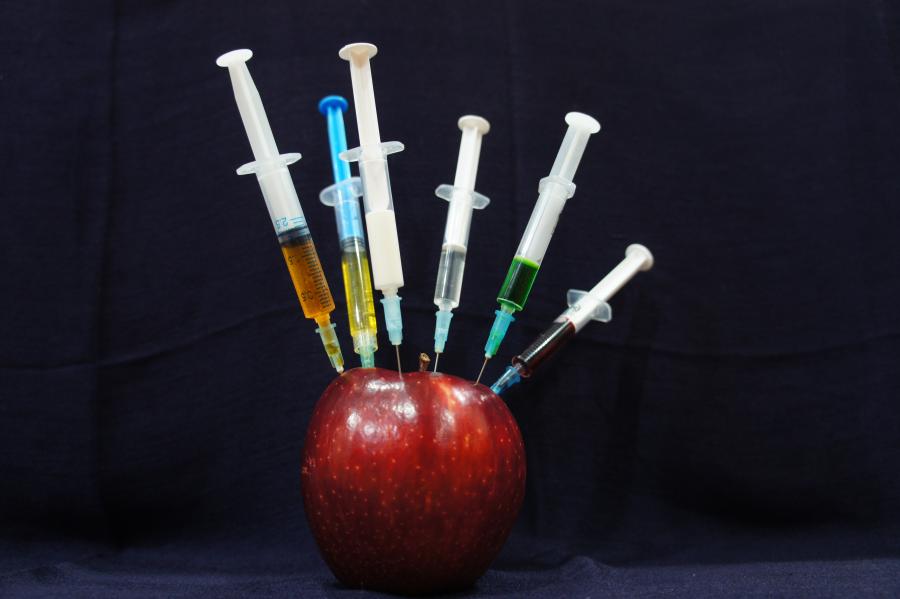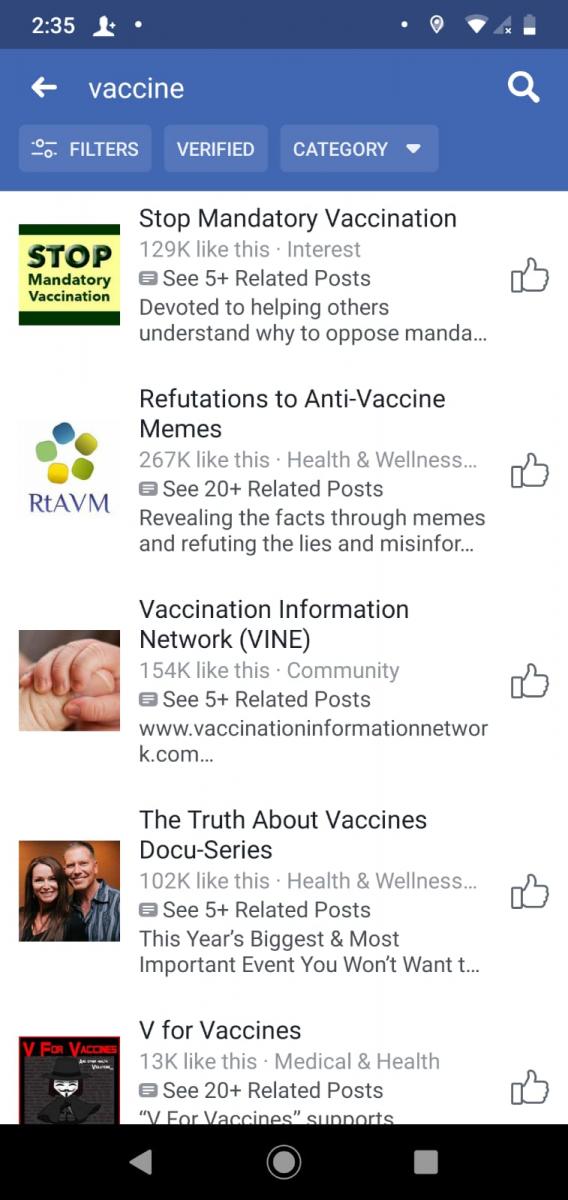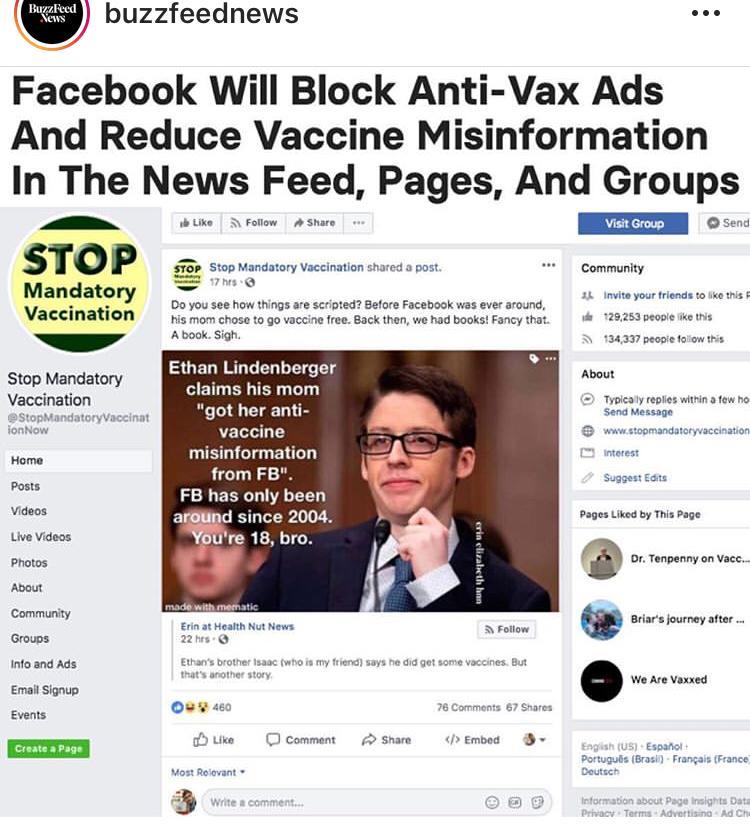
Anti-vaccine movement: the epidemic of stupid
Social networking platforms have contributed to a specific form of the epidemic of stupid: the anti-vaccine movement. These networking platforms are revolutionary inventions, creating a community beyond our traditional borders, that allows information to be passed along, with many people listening, engaging, and building relationships. The essence of serviceability provided by these platforms is abused and used to spread misleading information about vaccines. Anti-vaccine movements are not new, but due to social networking platforms this information can be spread on a larger scale. In turn, this contributes to the comeback of outdated diseases like measles in Europe and the USA.
The anti-vaccine movement and the comeback of a ‘Dark Ages disease’
Measles has made a comeback, not only in the USA but also in Europe. Some experts blame this on widespread misinformation about vaccinations. These misleading sources are spread via social media platforms, but also via product platforms like Bol.com whose algorithms seem to promote anti-vaccination books.
Anti-vaccine advocates attempt, for example, to convince people that vaccines against measles can cause autism. Following this claim, many parents have made the decision to not vaccinate their child in fear of the child developing autism. This conspiracy theory, therefor, can have serious and devastating effects.

The Anti-Vaccine
In 2019, there have been 372 outbreaks of measles in 2018 and already 206 cases since 28th February 2019 in the USA, according to the Centers for Disease Control and Prevention (CDC). In Europe, too, the amount of measles cases has tripled, according to a news report of Science on 12th February 2019. That translates as 83,000 reported cases of measles by the World Health Organization (WHO) in Europe.
The rather bizarre but also strangely ironic note in this, is that both reports have found one common leading issue that contributes to this problem: measles has made a comeback because of anti-vaccine sentiments. This means that there are an increasing amount of parents who judge that it is best to not vaccinate their child because there is a ‘unknown percentage’ of risk for a child to develop autism due to this vaccine. Instead of vaccinating a child these parents would rather let the child suffer from - and possibly die from - measles. What is more, measles is a highly contagious, infectious disease. Merely being in a room that somebody who has measles has left hours before, could already result in an infection.
The other thing that seems to be contagious is the misleading information spread by anti-vaccine movements. This has caused such an immense problem that the WHO has called the anti-vaccine movement a major threat to public health. They have labeled this epidemic ‘vaccine hesitance’. As the cause is complex, the WHO argues that the problem cannot be entirely blamed on anti-vaccine movements alone. Nevertheless, particularly Western countries increase in measles cases had been used as proof and warning that this might be due to the spread of misleading information.
In another report, Katrina Kretsinger, a lead measles expert, has said that ‘the root cause of the measles outbreaks [...] is a failure to adequately vaccinate’. This would explain the 30% increase in the spread of measles around the globe.
What is really the difference?
Most news reports see that the increase of measles cases is due to the fact that anti-vaccine movements have spread misleading information on social media platforms, which makes concerned parents to adopt the drastic measure of not vaccinating their child. According to the New York Times ‘flu vaccination rates and infant immunization levels have largely remained stable in recent years’. However, the link that was used by the New York Times to prove that vaccines remain stable is from 2017, whereas the aforementioned increase of measles cases happened in 2018 and 2019.
The New York Times claims that the anti-vaccine movement has been around since the 18th century, hence, ‘fears and resistance to vaccination are not new’.
The report acknowledges the link between anti-vaxxers and the increase in measles cases, but does not address to what extent social networking platforms have contributed to this influential relationship, even though many others have found compelling evidence of a connection between the two phenomena.
That is to say, the outbreak of measles in recent cases has been blamed upon anti-vaxxers being able to spread misleading information on social networking platforms. Therefore, what follows offers a discussion on how social networking platforms influence and contribute to the measles epidemic.
Social networking platforms in connection to anti-vaxxers
None other than the ‘preciously-alluring’ platform kings of the internet - Facebook, YouTube, Pinterest, and Amazon - play the leading roles in this epidemic. However, instead of blaming these platforms themselves, we need to consider the usage of them. The internet is a great space for movements such as for the anti-vaxxers. This is due to the fact that the internet offers a space in which anyone can spread any type of information. This offers members of anti-vaccine movements to read and spread misleading information that is not scientifically supported.
If one types ‘vaccine’ into the Facebook search engine, the first results that show up are anti-vaccination content.
Pages such as ‘Stop Mandatory Vaccination’ have 129K likes. According to the WELT, clicking 'like' on any of these pages, will immediately redirect you to many other pages that promote anti-vaccination. Particularly in the USA this has inspired discussions that force Facebook to take preventive measures against this dynamic.

Facebook search engine results for Vaccine
At the end of February, Facebook first agreed ‘to get tougher on anti-vaxxers’, without stating exactly what actions this would entail. On March 7th, Facebook announced that it ‘will no longer allow advertisements that include misinformation about vaccines as part of an effort to reduce the spread of ‘vaccine hoaxes’ on the platform’.

Facebook taking action against Anti-vaxxers
YouTube, too, took action against channels that promoted anti-vaccination videos. According to BuzzFeed News, YouTube’s 'Up next' algorithm recommended users anti-vaccination videos after watching a pro-vaccine video. They had tested the website by searching for ‘immunization’ without any previous recorded personal data or watch history. The first video offered for this search was from the pro-vaccination channel Rehealthify. The following suggested video, however, was an anti-vaccination clip titled ‘Mom Researches Vaccines, Discovers Vaccination Horrors and Goes Vaccine Free’. This clip came from a channel owned by Larry Cook, who is the owner of the popular anti-vaccination website ‘StopMandatoryVaccination.com’, which had already been scrutinized by Facebook.
‘YouTube is a place where we see users not only for entertainment. They come to find information.’
- Google CEO Sundar Pichai
BuzzFeed News elaborated on the fact that YouTube is not only affected by conspiracies theory of anti-vaxxers but also by the ‘steady stream of videos of crying parents who genuinely believe vaccines harmed their children that keeps the movement boosted’. It was still unclear at that moment how YouTube would take measures against this, but as of now, YouTube had promised to demonetize channels promoting anti-vaccines.
Another platform that was involved in this turmoil is Pinterest. Their search engine had also recommended many anti-vaccine facts. The platform was forced to block vaccination searches that had contradicting medical guidelines and images that cautioned against vaccinations. Similar decisions were made at Amazon. At the beginning of March, California Congressman Adam Schiff was wrote a personal letter to Amazon boss Jeff Bezos regarding the anti-Vaccine information accessible on their website. Shiff was concerned about the ‘surfacing and recommending products and content that discourage parents from vaccinating their children’, describing it as a ‘direct threat to public health’. He added that this spread was causing a ‘reversing progress made in tackling vaccine-preventable diseases.’ Amazon then removed anti-vaccination documentaries from their search results for Prime videos, stated Buzzfeed News.
In 2018, 35 deaths caused by measles have been reported in the EU countries that had previously eradicated or interrupted the endemic of the transmissions of measles. As of yet, in 2019, the highest numbers of outbreak cases had been documented in Romania, Italy, Poland, and France. The European Centre for Diseases Prevention and Control (ECDC) states that there have been 881 cases reported around 19 countries, but 10 of these did not report any outbreaks. For example, Germany ‘did not report measles data for 2019’, states ECDC, even though there had been 546 reported cases between December 2017 and November 2018.
The WELT found examples of links on German Facebook pages that resemble the American cases: promoting ‘anti-vaccine propaganda’ instead of providing scientifically supported evidence. The newspaper also carried out a similar test to that of BuzzFeed News, by typing ‘Impfen’ (‘vaccinate’) into the search engine and found hits relating to the same anti-vaccine nonsense as in the American case. Included in the first five results were the pages ‘Impfen Pro &Contra’ [Vaccinate Pros&Cons], ‘Maßvoll Impfen’ [moderate Vaccination] and ‘Nicht impfen- was dann’ [No vaccination - what now]. The WELT applied same test to YouTube and found a less concerning outcome. Nevertheless, in the top ten results there where two anti-vaccine Titles; ‘Wir impfen nicht’ [We do not vaccinate] and ‘Impfen macht erst krank’ [Vaccines above all triggers sickness].
The growing concern on the measles outbreaks corroborates with the spread of radical anti-vaccine information on different internet platforms. It would be expected that this would induce a political intervention in Europe to stop the misconception, as has happened in the US.
What can we do for today and tomorrow?
The Washington Post has suggested that the contemporary anti-vaccine movement should be labeled as ‘the modern anti-vaxxer movement,' because it is gaining momentum even though there is no evidence that proves that vaccines can cause autism at all. There is a need to take immediate action. This was brought to the attention of the Senate through a hearing on ‘Vaccines Save Lives: What is Driving Preventable Disease Outbreaks’, in which an 18-year-old boy called Ethan Lindenberger demanded for attention.
Lindenberger had received vaccinations even though his mother, who is a firm believer in the anti-vaccination movement, had forbidden him to do so. He is set to testify in front of the Senate committee. He urges to ‘combat preventable-disease outbreaks, information [...]’, and says that the leading source of this issue is social media, claiming that his mother ‘would turn to anti-vaccine groups online and on social media, looking for her evidence in defense [...]’.

The Health of a Child is Important
This is just one case out of many more. In another case, an unvaccinated boy was infected with tetanus and it cost his parents $800,000 to save his life. Even after this procedure his parents refused their son to be vaccinated, because of their fears fueled by anti-vaccine information. This CDC report was published and aimed at a corroborated 'growing anti-vaccination movement bolstered by the spread of misleading content social media platforms', claims BuzzFeed News.
Nonetheless, children are usually forced to listen to their parents because their parents possess full legal custody over their children. Which makes sense: a parent should have full responsibility for their underaged children. But what happens if this legally responsible parent believes in anti-vaccine information that has no base in scientific evidence and causes their child or others to receive measles as a result of not vaccinated their child? When can we say that ‘enough is enough’? How many kids have to suffer, before somebody steps in? Or will we forever have to encounter the new Joshua Nerius - the 30-year-old son of anti-vaxxers diagnosed with measles?
The solution: vaccinate
It is undeniable that this situation needs to receive special attention. It has impacted society on a global level, because people travel more frequently than ever before. Therefore, it becomes more likely that unvaccinated individuals come into contact with people in environments were vaccinations are not as affordable as e.g. in most Western countries. Let us not take advantage of our privilege and realize that we do not need to be looking for a new answer, for we have already got one.
On social media, the same places that allow anti-vaxxers to spread their misinformation have also become the places where the movement is challenged by pro-vaxxers. The pro-vaxxers use the internet to spread ‘images from the darkly humorous to the occasionally brutal as well as the informational’, that are targeted at anti-vaccine audiences. These pro-vaxxers felt the need to step in, because ‘social media companies have been slow to act’. The members of the pro-vaccine movement prefer to stay anonymous because they have been harassed multiple times by anti-vaxxers. One of the pro-vaxxers remarks that their mission is to ensure that ‘people to find the very idea of being or becoming anti-vax laughable’ and to create the feeling ‘that no reasonable person would ever want to be perceived as being [one of them]’.
References
Abril, D. (2019, February 5). YouTube Nears Major Milestone Amid Emphasis on Subscriptions. Retrieved March 10, 2019.
Arciga, J. (2019, February 15). Anti-Vaxxer Larry Cook Has Weaponized Facebook Ads in War Against Science. Retrieved March 10, 2019.
Bickert, M. ( 2019, March 7). Combatting Vaccine Misinformation. Retrieved March 7, 2019.
Bonifield, J & Cohen, E. (2019, February 26). Facebook to get tougher on anti-vaxers. Retrieved March 7, 2019.
Bracho-Sanchez, Dr. E. (2019, March 5). MMR vaccine does not cause autism, another study confirms. Retrieved March 7, 2019.
Burrows-Taylor, E. (2019, March 4). Why France is increasingly concerned about the steep rise in measles cases. Retrieved March 7, 2019.
Caron, C. (2019, February 23). Pinterest Restricts Vaccine Search Results to Curb Spread of Misinformation. Retrieved March 7, 2019.
CDC. (2018, October 12). Vaccination Coverage Among Children Aged 19-35 Months- United States, 2017. Retrieved March 7, 2019.
CDC. (2019). Measles Cases in 2019.Retrieved March 7, 2019.
CDC. (2019). Transmission. Retrieved March 7, 2019.
Cohen, E. (2019, March 8). Anti-Vaxers' adult son gets measles;now, he has this message for the world. Retrieved March 12, 2019.
ECDC. (2019). Measles report. Retrieved March 10, 2019.
Felton, J. (2019, March 5). Study On 657,461 Children Finds No Link Between Vaccines And Autism. Retrieved March 8, 2019.
Fuest, B. (2019, March 8). Das Interenet- Wohlfüloase für Impfgegner? Retrieved March 8, 2019.
Howard, J. (2019, March 7). Teen who defied mom to get vaccinated calls for anti-vaccine misinformation to stop. Retrieved March 7, 2019.
Iannelli, V. (2019, February 10). Autism in Vaccinated and Unvaccinated Children. Retrieved March 7, 2019.
Kirkpatrick, M. (--). The anti-vaccination movement. Retrieved March 7, 2019
Nyhan, B. (2019, March 6). What Really Makes a Difference in Vaccination Rates? Retrieved March 7, 2019.
O' Donovan, C. (2019, February 22). YouTube Just Demonetized Anti-Vax Channels. Retrieved March 10, 2019.
O’Donovan, C. (2019, March 1). Amazon Removed Anti-Vax Documentaries From Prime Video. Retrieved March 7, 2019.
O’Donovan, C. & McDonald, L. (2019, February 20). YouTube Continues To Promote Anti-Vax Videos As Facebook Prepares To Fight Medical Misinformation. Retrieved March 7, 2019.
Pencak, S. (--).Top 50+ Social media Quotes. Retrieved March 7, 2019.
Sacks, B. (2019, March 8). An Unvaccinated Boy Got Tetanus And it Cost over $800,000 to Save His Life. Retrieved March 11, 2019.
Shiff, A. (2019, March 1). Schiff Sends Letter To Amazon CEO Regarding Anti-Vaccine Misinformation. Retrieved March 9, 2019.
Shu, C. (2019, February 20). YouTube demonetizes anti-vaccination videos. Retrieved March 7, 2019.
Telford, T. (2019, February 15). Facebook will consider removing or demoting anti-vaccination recommendations amid backlash. Retrieved March 7, 2019.
Wadman, M. (2019, February 12). Measles cases have tripled in Europe fueled by Ukrainian outbreak. Retrieved March 7, 2019.
Welch, A. (2019, February 18). Misinformation online helps fuel measles outbreak, experts say. Retrieved March 7, 2019.
WHO. (2019). Ten threats to global health in 2019. Retrieved March 7, 2019.
Wong, J.C. (2019, March 7). Facebook to ban anti-vaxx ads in new push against ‘vaccine hoaxes’. Retrieved March 8, 2019.